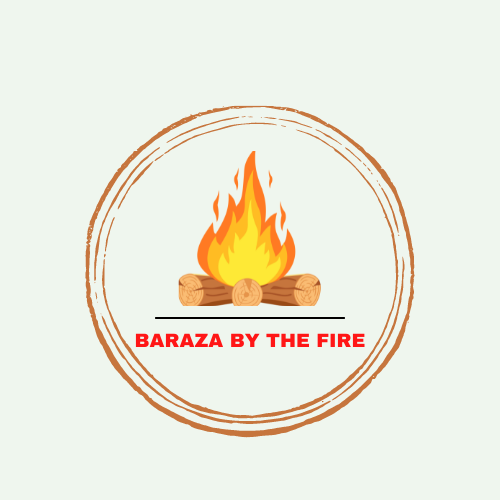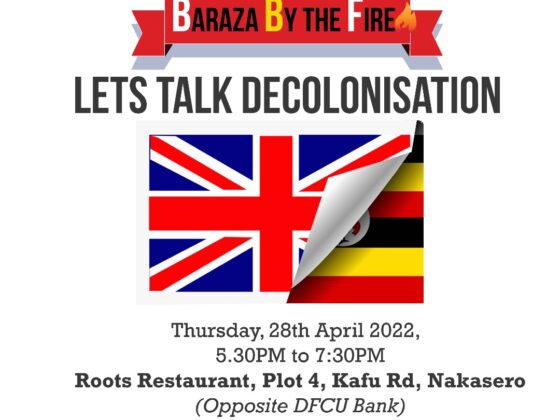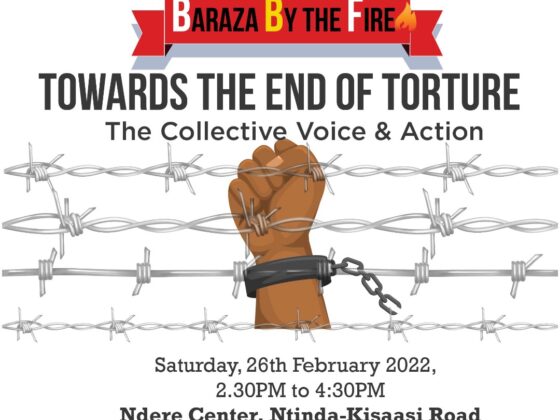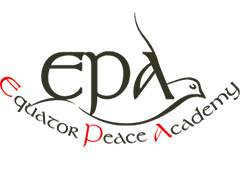This year, Baraza By the Fire (B.B.F) has been majorly happening online using the Zoom platform, except for a few sessions where we met physically. The first two conversations that took place in January and February happened at our meeting place at Roots Restaurant. However, due to the effects of COVID-19 and the banning of all public gatherings, we had to move the meetings to an online platform until November.
This, however, did not have any effect on the attendance. We still have an average of 20 people attending the meetings. And due to the fact that people were locked down at home, the decision was taken to hold the conversations twice every month.
Also, because of the events of the times we are in, the topics chosen were influenced by what is happening in our society. Conversations have ranged from how COVID-19 has impacted on our lives, to the risk of individualism and loss of the communal spirit due to the fact that we are in a state of lock down, to how the lockdown has affected people’s mental health and right down to conversations on elections which are happening early next year. These conversations have been very helpful in making sense of the present circumstances and how we should live as a result. They have also helped ease tensions that are caused by our religious and cultural differences, and developed our desire to hold proper, open and meaningful conversations.
The following are just a few testimonies from some of the participants;
“Just wanted to say that you all are doing an amazing job. Very few platforms impact the way I think through life and my faith like BBF. It is a mighty difficult path to tread, but I am glad God has made you and the team bold enough to choose the road less traveled. We need conversations like these more often. I will be praying for you and Interface…
A great lesson for me today was, before I speak, to listen. Not just to what someone says, but to their heart…as a person…someone in search of truth, whether or not I think they have found it. I have been challenged, not just in light of the topic, but in how I treat and think about people who do not believe like I do. It was awesome. I am excited for the next one.” Malcolm Kawooya.
“It was a healthy conversation. Hearing people’s stories about social justice showed me a yearning for a better world but unfortunately it is not being realized…
It was a conversation of realities as we have them in this world, realities shared by all or say many in Uganda but also globally. It was healthy in a sense that there were no attacks on people’s world views (people sharing reality as it is). Though of course every word has a worldview behind it.
What I heard was a yearning for peace, justice and harmony among the diverse participants. So it was helpful for me to hear, and raise questions for my further engagement.” Boaz Atuheire.
“I personally liked the conversations on mental health. I think they were rich and very real. They pushed me to think more critically about mental health.
Also from the conversations on mental health, my convictions grew stronger concerning why voting should not be a measure of a good citizen.” Rev. Gideon Muhima.
- #YouToo: A Conversation on Abuse, Consent and Culture.
Date: 30th January 2020
Summary: In this conversation, participants defined rape culture and detailed everything it entails. There was an appreciation that sexual abuse is not just physical, but also involves such seemingly uninjurious things as cat-calling. There was also a discussion on how sex is wielded as a tool of power in relationships.
- Navigating Relationships: Sex, Power, Silence.
Date: 27th February 2020
Summary: This conversation followed up on the earlier conversation concerning abuse, consent and culture. It centered on how people, both men and women, use the power they yield to demand for sex from others, from employers, to teachers and other people who wield power over others.
- How has the COVID-19 Pandemic Impacted on Our Perception of Faith, Culture and the World?
Date: 2nd April 2020
Summary: For some, the pandemic confirmed the existence of God and confirmed their faith. On the other hand, it has led to others trying to answer unanswerable questions, rather than leaving the mystery to be. For many people, times like these should galvanize and bring us together, heightening a communal spirit. There were concerns, however, that people never learn. While this pandemic ought to stress the fact that we are better together, many of us are likely to resort back to our selfishness when this has passed.
- How is Social and Other Media Influencing Our Response to the COVID-19 Pandemic?
Date: 16th April 2020
Summary: There was a discussion around how the media has contributed to negative responses to the pandemic. Anxiety that led to panic shopping was mainly attributed to this. In addition, there was a discussion on how this pandemic should cause religious institutions to think of alternative ways to reach out to their congregants, by utilizing the media avenues present.
- COVID-19 and the Leadership Question; My Perspective and Participation.
Date: 7th May 2020
Summary: The main talking points here were what leadership is and what it entails, both on a national level and on a localized or community level. There was also a conversation around how our national leadership keeps deteriorating by being more and more selfish, and what needs to be done to rectify this. People were convinced to be more intentional in holding their leaders accountable as well as seeking to provide better leadership in their different spheres of influence.
- The Culture of Community; Drowned Out by Individualism?
Date: 21st May 2020
Summary: This conversation focused on the fact that our society has gradually lost its sense of communalism, and embraced an individualistic mindset mainly from the West. Traditionally, children grew up in a communal setting, playing with other children. Communities had initiatives that brought them together to work for the good of society. Children were raised by the whole village. However, all this has gradually been eroded. And this has been partly intentional, since economies are intentionally constructed. The solution then is for us to be intentional in shedding off this individualistic mindset and going out of our way in being involved in the plight of those around us.
- The Place of Community in Confronting Abuse of Power.
Date: 4th June 2020
Summary: Stress was placed upon the fact that abuse of power is not only by government institutions, but also stretches down to individuals, families and communities, especially in instances of domestic violence. In the case of our nation, power has been misused to the extent that people are numb to the plight of others. Faith and cultural institutions should champion the fight against abuse of power, as voices to the voiceless. Emphasis was also placed on power being nurtured, so meaning making social institutions (families, education and faith institutions) need to be focused upon if society is to have good leaders in the future.
- Religion, Faith and Social Justice; To Be or Not To Be Involved?
Date: 18th June 2020
Summary: In this conversation, participants shared thoughts on what social justice is, especially as understood within the lenses of their religious beliefs. They also shared views on whether they see participation in social justice causes as necessary given their religious beliefs or lack of.
- Religion, Faith and Social Justice in Uganda: Sharing Our Stories.
Date: 2nd July 2020
Summary: The conversation centered around two eminent people; Bishop Zac Niringiye and Imam Kasozi who shared their stories of involvement in social justice causes in Uganda. They shared their life stories, and responded to questions from the rest of the participants.
- Let’s Talk Mental Health
Date: 16th July 2020
Summary: In this conversation, different people opened up on how they have struggled with mental health issues; from depression to bipolar and other issues. Many confessed that the COVID-19blockdown exacerbated these issues. For others, it was a time to share how they are involved in mental health work.
- Let’s Talk Mental Health 2
Date: 30th July 2020
Summary: On this day, we had two mental health professionals; Harriet and Lindsey, who gave us a general overview of mental wellness and illness and answered all our questions concerning the above.
- Mental Health and the Workplace
13th August 2020
Summary: Here, the mental health conversation focussed on how workplaces contribute to people’s mental welfare. It was noted that many workplaces are not consciously aware that their demands and pressure can negatively affect the employees’ mental health, and most attendants agreed that such conversations need to happen more to mitigate problems that might arise as a result.
- Self Harm in our Religious and Cultural Contexts
27th August 2020
Summary: In this conversations, members explored how self harm and suicide are viewed in their different cultural and religious contexts. There were presentations on how self harm is understood, cultural and religious beliefs and myths surrounding suicide, explanations for the different beliefs and myths, and to what extent self harm is an issue. A number of people shared their stories of attempted suicide and the reasons behind that.
- Religion: How it Influences Our Election Choices
24th September 2020
Summary: This BBF kicked off our conversation series on elections. In this conversation, we explored how our religions are influencing our political decisions, especially the choice of our leaders. For many people who attended, their religious affiliation greatly affected their political decisions. It also informed how they engaged politically; either actively or passively.
- Tribe: How it Influences Our Election Choices
8th October 2020
Summary: On this day, the conversation revolved around the impact of tribe and ethnicity on our political decisions. It emerged that one’s tribe determines, to a certain extent, how they engage politically. It became clear that tribes have a huge impact on our politics. An example was given of how people get divided along tribal and ethnic lines once they get to University, and it is at the University that most people become politically active.
- Elitism: How it Influences Our Election Choices
22nd October 2020
Summary: In this conversation, a distinction was made between elites and elitism. It emerged that elites are those members of society that have attained a certain social and economic status, which puts them in a certain place of influence. Elitism on the other hand, is where the privileged in society create a class separate from the unprivileged, and minimize those they consider of a lower status, which results in social and economic inequalities. Consequently, elitism has created a certain level of indifference towards politics since many of the privileged would rather keep the status-quo for the sake of their economic safety.
- Elitism: How it Influences Our Election Choices
5th November 2020
Summary: Here, we continued with the conversation on elitism, noting how elitism is negatively affecting many people’s desire to engage in the political life of the country.
- I am Ugandan; So What? 19th November 2020
This last conversation of the year came at a time of political instability due to the riots that took place that week as a result of the arrest of one of the main political actors in the opposition. We ventured to ask what makes us Ugandan and whether we were proud to be Ugandan. The responses varied from greatly proud to being ashamed as a result of what was happening in the political environment






